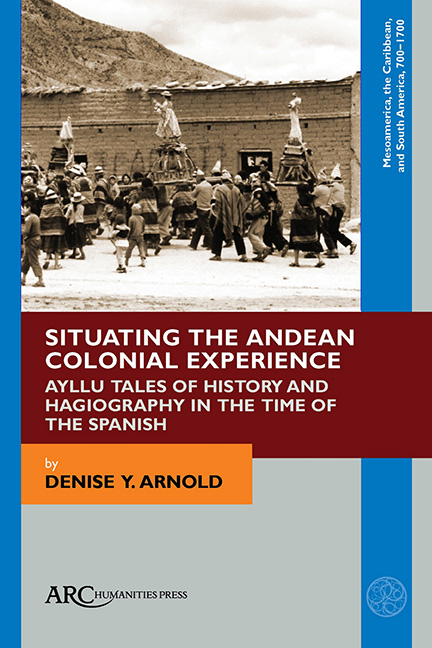 Situating the Andean Colonial Experience
Situating the Andean Colonial Experience Book contents
- Frontmatter
- Contents
- List of Illustrations
- Note About the Spelling of Toponyms and Proper Names
- Acknowledgements
- Maps
- Introduction
- PART ONE THE ORAL HISTORY OF QAQACHAKA
- PART TWO THE COLONIAL CACIQUES IN ORAL AND WRITTEN HISTORY
- PART THREE QAQACHAKA MARKA
- PART FOUR THE SAINTS APPEAR
- PART FIVE THE RELIGIOUS PRACTICES OF QAQACHAKA MARKA
- Some Conclusions
- Glossary
- Appendix A Document C of Don Franco Quispe Maraza
- Appendix B Document K of Don Franco Quispe Maraza
- Bibliography
- Thematic Index
- Index of Toponyms
Chapter 7 - The Caciques of Qharaqhara and Quillacas-Asanaque
Published online by Cambridge University Press: 22 June 2021
- Frontmatter
- Contents
- List of Illustrations
- Note About the Spelling of Toponyms and Proper Names
- Acknowledgements
- Maps
- Introduction
- PART ONE THE ORAL HISTORY OF QAQACHAKA
- PART TWO THE COLONIAL CACIQUES IN ORAL AND WRITTEN HISTORY
- PART THREE QAQACHAKA MARKA
- PART FOUR THE SAINTS APPEAR
- PART FIVE THE RELIGIOUS PRACTICES OF QAQACHAKA MARKA
- Some Conclusions
- Glossary
- Appendix A Document C of Don Franco Quispe Maraza
- Appendix B Document K of Don Franco Quispe Maraza
- Bibliography
- Thematic Index
- Index of Toponyms
Summary
The three Llanquepacha brothers were rich in gold, so rich that even their urine flowed like a gush of gold.
Doña Lucía Quispe, from Qaqachaka puebloIT IS ALREADY evident that the memories of oral history, dating back to the Time of the Spanish, highlight the importance of certain colonial caciques and not others. Why, then, this silence about those other caciques who do not appear in the oral history? This situation is complicated further because the ways some of these caciques are remembered in these tales do not always coincide with the written history about these personages. This occurs in the case of Ayra Chinche, presented in the narratives as a cultural hero of Qaqachaka, although he was a person vilified in official written history. This also happens with respect to the lineage of the Llanquepachas, recorded in the tales as caciques and governors of high status and prestige, but who in practice were hated by their people. So, why this lapsus between oral history and official written history?
I propose in this chapter that Qaqachaka comunarios tend to remember, and this with a certain nostalgia, those caciques who struggled in favour of the populations under their dominion, notably as intermediaries in the negotiations between their own sphere of power and authority, and that of the Colonial State, including the Spanish Crown and Church, regardless of their real implications in the lives of these people.
This is the emphasis we have heard until now in the tales told about Ayra Chinche, Takimallku Astiti, Lujano and Fernando Choquecallati, and the first ancestors called Llanquepacha, that they struggled in the conflicts over lands between the Spanish State and the ayllus, to establish juridically the boundaries of Qaqachaka, serving themselves in many instances as mitayos to assure their legal rights to these territories, as defined by the colonial regime. This has also been the emphasis in the tales about the important ancestress Juana Doña Ana, in her role as a boundary maker, and about her sister Inka Mariya, who made the lands of the ayllu fertile by kicking far away the overly hot waters bubbling initially in the central plaza.
- Type
- Chapter
- Information
- Situating the Andean Colonial ExperienceAyllu Tales of History and Hagiography in the Time of the Spanish, pp. 117 - 158Publisher: Amsterdam University PressPrint publication year: 2021


